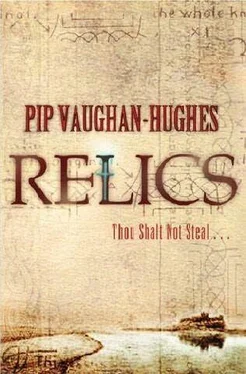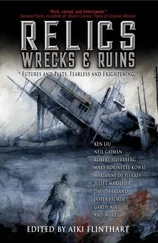Pip Vaughan-Hughes - Relics
Здесь есть возможность читать онлайн «Pip Vaughan-Hughes - Relics» весь текст электронной книги совершенно бесплатно (целиком полную версию без сокращений). В некоторых случаях можно слушать аудио, скачать через торрент в формате fb2 и присутствует краткое содержание. Жанр: Исторический детектив, на английском языке. Описание произведения, (предисловие) а так же отзывы посетителей доступны на портале библиотеки ЛибКат.
- Название:Relics
- Автор:
- Жанр:
- Год:неизвестен
- ISBN:нет данных
- Рейтинг книги:4 / 5. Голосов: 1
-
Избранное:Добавить в избранное
- Отзывы:
-
Ваша оценка:
- 80
- 1
- 2
- 3
- 4
- 5
Relics: краткое содержание, описание и аннотация
Предлагаем к чтению аннотацию, описание, краткое содержание или предисловие (зависит от того, что написал сам автор книги «Relics»). Если вы не нашли необходимую информацию о книге — напишите в комментариях, мы постараемся отыскать её.
Relics — читать онлайн бесплатно полную книгу (весь текст) целиком
Ниже представлен текст книги, разбитый по страницам. Система сохранения места последней прочитанной страницы, позволяет с удобством читать онлайн бесплатно книгу «Relics», без необходимости каждый раз заново искать на чём Вы остановились. Поставьте закладку, и сможете в любой момент перейти на страницу, на которой закончили чтение.
Интервал:
Закладка:
I paused. There was one more question to be answered, and I hardly dared ask it. But ask I must.
'Captain,' I began hesitantly, "You, Gilles and the others from… from Provence: forgive me, but are you what I would call Cathars?'
To my immense relief he smiled, the weariest smile I had ever seen. 'There is nothing to forgive, my boy. We are indeed cathari – Cathars. Was it such a hard guess?'
'No,' I said, and he chuckled. 'Then we are not as mysterious as we suppose ourselves to be,' he said. We are credenti – believers, the least of our kind, but there are few of us now indeed, and perhaps…' he shook his head. "You do not fear us, at least, and I do not think you even judge us.' 'I do not,' I interrupted. 'That is good. And what do you think?'
'I can guess what became of the grapes you tended as a boy,' I said quietly. 'News reached us even down in Devon, and so I heard of the war against your people from my friend Adric. For the Cathars, I am sure you know what nonsense they teach boys: cat-worship and blasphemy. I have also heard that you believe the Devil created the earth, and that Christ is a ghost, and that you swear no oaths, for there is no one above you save God himself.' I paused. 'In my present mood, and at this point where I find myself, I am no friend to my Church, and when I look for faith I find myself as empty as a new-dug grave. I mean that I can find no fault in your people's beliefs.'
The Captain gazed at me for a long silent moment.*You are… indeed you are the very first man I have heard such words from. I know the turmoil of your soul, and I will not press you further. But I will say one more thing, and then we are done with this matter: if you would know more – and there is much to learn – we will be glad to teach you. I believe you will know when the time is right.'
He reached for a mutton-bone, took a small bite and tossed it into the hearth. The deep glow from the flame-caressed embers had lent his profile a sombre, brooding edge, and his grey eyes held splinters of fire. He ran his thumb along the lip of his wine-cup again and again.
'Master,' I said, feeling as I did so the sensation of falling, so strongly that I reached out and grabbed the table's edge, 'you have given answers to all my questions, and I have given none to yours. Here is my answer: I will join you. My head is glad, but my heart is empty. If you will have a soul that is beyond care and a spirit that has lost its footing in the darkness, I will serve you. My love of Mother Church has curdled, and I see only rottenness where I once saw salvation. If you can use someone like me, I am yours.' So saying, I took a great gulp of the wine, and met the Captain's level gaze.
'Done,' said de Montalhac, and grasped my hand. 'I have the better bargain, Master Petroc of Auneford. Your heart is not empty: it is full and strong, and your soul is but dull and sooty with the smoke of false ritual. It will shine once more. You are one of us now. You are right: my people do not swear oaths, so you come with us of your own free will, and you may leave when and where you wish.'
We drank again, and slowly the night's edges softened once more until we were nothing but two friends enjoying wine, warmth and each other's company. But I was not the same as I had been before. My faith was gone: I knew it for a certainty.
Chapter Twelve
W
e left Greenland two days later. I had not seen much of the Captain, as I was busy about the ship and he was away in town conducting business – and I will admit that, now I had a clear notion of what that business was, I dwelt upon his affairs with a much enlivened interest.
I was on deck on the afternoon of the day that followed our strange night at the inn, lashing water barrels in place. The Captain swept up the gangplank, vexation clearly written on his face. He went straight to his cabin and slammed the door behind him, and I heard his voice and that of Gilles raised in some heated debate. Then all of a sudden there was laughter, and the Captain swept out again, this time with a big grin. He trotted back down the plank and off into the sorry huddle of Gardar.
Late the next day, as the sun – which had honoured us with a watery light since noon – was going down behind the mountainous promontory in the west, there was a sudden hubbub on the wharf. I was sitting in the forecastle, mending rope. Peering over the side, I saw a gang of the crew, led by the Captain and Pavlos, struggling with three long bundles, each around six feet long, knobbled and bulky and wrapped in black tarred canvas. The cloth looked slippery, or perhaps the bundles were very heavy, for the men were having a difficult time keeping a grip. I skipped down the ladder and called out to offer my help, but Pavlos waved me away. Finally, grunting and cursing in the most livid tones, the men hoisted each bundle onto their shoulders and bore them on board. They were manhandled down into the hold, where more muffled oaths told me that, in the cramped space below decks, the burdens were even more awkward. At last Pavlos emerged, dusty and bleeding slightly from a banged temple. What the devil was all that?' I asked him.
He spat and rubbed his wound. 'Jesus, Mary Madonna and every one of the fucking saints. Whalebone! A wonderful idea, wouldn't you say? Enough whalebone to build a sister-fucking elephant. Or a bastard whale.' He stamped away and vanished into the Captain's cabin.
I couldn't help laughing as I went back to my frayed rope. A whalebone elephant, perhaps. Or a hundred, a thousand fornicating dolls, one for every bishop in Christendom. Ha! I spat in my turn, feeling uncommonly happy to be alive.
We cast off before dawn the next day. Our return from Gardar is not a memory I often dwell upon. Almost from the minute we left the pathetic harbour at the edge of the world we were forging through an endless expanse of clear green waves that towered on all sides. Sometimes, when the wind came less fiercely, they loomed like smooth hills, so that I imagined we were in a kind of watery downland, the chalk hills of England turned to liquid on some devil's whim. But when the gales blew – and they blew, day in, day out, for two weeks – the hills became mountains that reared above us, their sharp peaks and ridges trembling like monstrous green flames, spume flying from them like smoke.
I was on deck now as often as any crewman – indeed I was a sailor now for all intents and purposes. It had happened on the crossing from Iceland: although no one had ordered me to work, I fell into it naturally, and soon I was mending sail and hauling ropes alongside the rest of them. At first my soft scholar's hands rebelled and I spent two or three days with them salved and bound while the salt-inflamed blisters dried. But soon my fingers and palms grew tough and hide-like, a transformation that I found obscurely pleasing. Before sleep I would feel each callous with a kind of modest pride. I suppose they were a symbol of my greater transformation, although then I thought only that they reminded me of when I worked alongside my father, building stone walls and wrestling sheep at shearing-time. The long passage of time between then and now, my long sleep, as it seemed, at the abbey and then in Balecester, was starting to fade a little, like a well-remembered dream.
Another transformation had taken place. It had been months since I had even thought about the language we all used aboard. It was the lingua franca, a traders' simple tongue, bastard child of Occitan and the many dialects spoken by the folk of Italy and Spain with scraps borrowed from Arabic, Greek, Ladino and a hundred other languages of the world. I had limped along for the first month on a smattering of French, ancient Greek, Latin of course, and a few shards of German. But without really knowing how, I had learned the lingua franca, and at the same time I found I had begun to know Occitan, the native tongue of the Captain, Gilles and perhaps a quarter of the crew. I grew to love its gentleness and poetry, so much at odds with the harsh, matter-of-fact life aboard a ship sailing the deep ocean.
Читать дальшеИнтервал:
Закладка:
Похожие книги на «Relics»
Представляем Вашему вниманию похожие книги на «Relics» списком для выбора. Мы отобрали схожую по названию и смыслу литературу в надежде предоставить читателям больше вариантов отыскать новые, интересные, ещё непрочитанные произведения.
Обсуждение, отзывы о книге «Relics» и просто собственные мнения читателей. Оставьте ваши комментарии, напишите, что Вы думаете о произведении, его смысле или главных героях. Укажите что конкретно понравилось, а что нет, и почему Вы так считаете.












